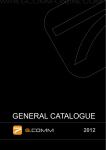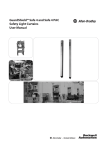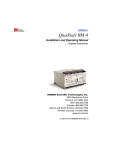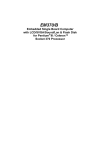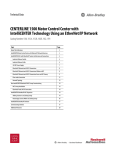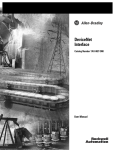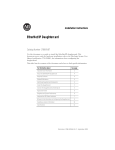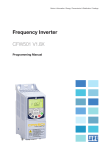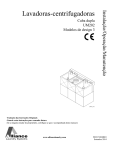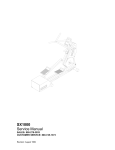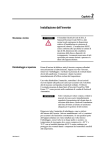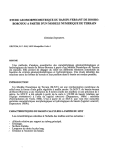Download 7000-UM203 - Rockwell Automation
Transcript
User Manual PowerFlex 7000 Series Safe Torque Off Publication 7000-UM203B-EN-P Original Instructions Important User Information Read this document and the documents listed in the additional resources section about installation, configuration, and operation of this equipment before you install, configure, operate, or maintain this product. Users are required to familiarize themselves with installation and wiring instructions in addition to requirements of all applicable codes, laws, and standards. Activities including installation, adjustments, putting into service, use, assembly, disassembly, and maintenance are required to be carried out by suitably trained personnel in accordance with applicable code of practice. If this equipment is used in a manner not specified by the manufacturer, the protection provided by the equipment may be impaired. In no event will Rockwell Automation, Inc. be responsible or liable for indirect or consequential damages resulting from the use or application of this equipment. The examples and diagrams in this manual are included solely for illustrative purposes. Because of the many variables and requirements associated with any particular installation, Rockwell Automation, Inc. cannot assume responsibility or liability for actual use based on the examples and diagrams. No patent liability is assumed by Rockwell Automation, Inc. with respect to use of information, circuits, equipment, or software described in this manual. Reproduction of the contents of this manual, in whole or in part, without written permission of Rockwell Automation, Inc., is prohibited. Throughout this manual, when necessary, we use notes to make you aware of safety considerations. WARNING: Identifies information about practices or circumstances that can cause an explosion in a hazardous environment, which may lead to personal injury or death, property damage, or economic loss. ATTENTION: Identifies information about practices or circumstances that can lead to personal injury or death, property damage, or economic loss. Attentions help you identify a hazard, avoid a hazard, and recognize the consequence. IMPORTANT Identifies information that is critical for successful application and understanding of the product. Labels may also be on or inside the equipment to provide specific precautions. SHOCK HAZARD: Labels may be on or inside the equipment, for example, a drive or motor, to alert people that dangerous voltage may be present. BURN HAZARD: Labels may be on or inside the equipment, for example, a drive or motor, to alert people that surfaces may reach dangerous temperatures. ARC FLASH HAZARD: Labels may be on or inside the equipment, for example, a motor control center, to alert people to potential Arc Flash. Arc Flash will cause severe injury or death. Wear proper Personal Protective Equipment (PPE). Follow ALL Regulatory requirements for safe work practices and for Personal Protective Equipment (PPE). Allen-Bradley, Rockwell Software, Rockwell Automation, and TechConnect are trademarks of Rockwell Automation, Inc. Trademarks not belonging to Rockwell Automation are property of their respective companies. Table of Contents Chapter 1 General Description What Is the PowerFlex 7000 Series Safe Torque Off Option? . . . . . . . . . Safety Standards Applied To Safe Torque Off Option . . . . . . . . . . . . . . . . Additional Resources . . . . . . . . . . . . . . . . . . . . . . . . . . . . . . . . . . . . . . . . . . . . . . Abbreviations . . . . . . . . . . . . . . . . . . . . . . . . . . . . . . . . . . . . . . . . . . . . . . . . . . . . . 5 6 6 7 Chapter 2 Safety Concept Introduction . . . . . . . . . . . . . . . . . . . . . . . . . . . . . . . . . . . . . . . . . . . . . . . . . . . . . . 9 Safety Certification. . . . . . . . . . . . . . . . . . . . . . . . . . . . . . . . . . . . . . . . . . . . . . . . 9 Important Safety Considerations . . . . . . . . . . . . . . . . . . . . . . . . . . . . . . . 9 Safety Category 3 Performance Definition . . . . . . . . . . . . . . . . . . . . . . 10 Stop Category Definitions. . . . . . . . . . . . . . . . . . . . . . . . . . . . . . . . . . . . . 10 Performance Level and Safety Integrity Level (SIL) CL3 . . . . . . . . . 11 Functional Proof Tests . . . . . . . . . . . . . . . . . . . . . . . . . . . . . . . . . . . . . . . . . . . 11 PFD and PFH Definitions . . . . . . . . . . . . . . . . . . . . . . . . . . . . . . . . . . . . . . . . 11 Safety Parameter Data . . . . . . . . . . . . . . . . . . . . . . . . . . . . . . . . . . . . . . . . . . . . 12 Reliability Data for 12-year Mission Time Test. . . . . . . . . . . . . . . . . . 12 Safe State . . . . . . . . . . . . . . . . . . . . . . . . . . . . . . . . . . . . . . . . . . . . . . . . . . . . . . . . 12 Safety Reaction Time . . . . . . . . . . . . . . . . . . . . . . . . . . . . . . . . . . . . . . . . . . . . . 12 Considerations for Safety Ratings. . . . . . . . . . . . . . . . . . . . . . . . . . . . . . . . . . 13 Contact Information if Safety Option Failure Occurs . . . . . . . . . . . . . . . 13 Chapter 3 Operation, Installation, and Wiring PowerFlex 7000 Series Safe Torque Off Operation . . . . . . . . . . . . . . . . . . Wiring . . . . . . . . . . . . . . . . . . . . . . . . . . . . . . . . . . . . . . . . . . . . . . . . . . . . . . . . . . Drive Input Isolation Device Interlock . . . . . . . . . . . . . . . . . . . . . . . . . . . . . Product Compatibility. . . . . . . . . . . . . . . . . . . . . . . . . . . . . . . . . . . . . . . . . . . . Parameter Setup. . . . . . . . . . . . . . . . . . . . . . . . . . . . . . . . . . . . . . . . . . . . . . . . . . SPS Jumper Settings . . . . . . . . . . . . . . . . . . . . . . . . . . . . . . . . . . . . . . . . . . Commissioning . . . . . . . . . . . . . . . . . . . . . . . . . . . . . . . . . . . . . . . . . . . . . . . . . . Verify Operation . . . . . . . . . . . . . . . . . . . . . . . . . . . . . . . . . . . . . . . . . . . . . . . . . 15 18 18 21 21 22 22 23 Chapter 4 System Components STO System Components Location . . . . . . . . . . . . . . . . . . . . . . . . . . . . . . . Optical Interface Boards 2 . . . . . . . . . . . . . . . . . . . . . . . . . . . . . . . . . . . . . . . . Replace Optical Interface Board 2. . . . . . . . . . . . . . . . . . . . . . . . . . . . . . Optical Interface Base Board Safety . . . . . . . . . . . . . . . . . . . . . . . . . . . . . . . . Replace Optical Interface Base Board Safety . . . . . . . . . . . . . . . . . . . . Optical Interface Base Board Safety Test Points . . . . . . . . . . . . . . . . . 25 27 28 29 30 31 Appendix A Specifications Introduction . . . . . . . . . . . . . . . . . . . . . . . . . . . . . . . . . . . . . . . . . . . . . . . . . . . . . 33 General Specifications . . . . . . . . . . . . . . . . . . . . . . . . . . . . . . . . . . . . . . . . . . . . 33 Environmental Specifications . . . . . . . . . . . . . . . . . . . . . . . . . . . . . . . . . . . . . 33 Rockwell Automation Publication 7000-UM203B-EN-P - March 2015 3 Table of Contents Certifications . . . . . . . . . . . . . . . . . . . . . . . . . . . . . . . . . . . . . . . . . . . . . . . . . . . . CE Conformity . . . . . . . . . . . . . . . . . . . . . . . . . . . . . . . . . . . . . . . . . . . . . . . . . . Machinery Directive (2006/42/EC) . . . . . . . . . . . . . . . . . . . . . . . . . . . EMC Directive (2004/108/EC) . . . . . . . . . . . . . . . . . . . . . . . . . . . . . . . 34 34 34 34 Appendix B Spare Parts and Preventative Maintenance 4 Spare Parts. . . . . . . . . . . . . . . . . . . . . . . . . . . . . . . . . . . . . . . . . . . . . . . . . . . . . . . 37 Preventative Maintenance. . . . . . . . . . . . . . . . . . . . . . . . . . . . . . . . . . . . . . . . . 37 Rockwell Automation Publication 7000-UM203B-EN-P - March 2015 Chapter 1 General Description The Safe Torque Off option is intended to be applied as a component in a safety control system. Components in the system must be chosen and applied appropriately to achieve the desired level of operational safety. What Is the PowerFlex 7000 Series Safe Torque Off Option? The PowerFlex 7000 Series Safe Torque Off option: • Is designed to help safely remove power from the gate firing circuits of the drive’s power devices (SGCTs). This helps prevent the drive’s power devices from switching in the pattern necessary to generate AC power to the motor. • Satisfies the STO definition in EN 61800-5-2:2007. • Can be used in combination with other safety devices to satisfy the requirements of IEC 61508, EN 61800-5-2 SIL 3, ISO 13849-1 PL e, and Category 3 for Safe Torque Off (STO). IMPORTANT This option is suitable for performing mechanical work on the drive system or affected area of a machine only. It does not provide electrical safety. This option should not be used as a control for starting and/or stopping the drive. ATTENTION: Electrical Shock Hazard. Verify that all sources of AC and DC power are de-energized and locked out or tagged out in accordance with the requirements of ANSI/NFPA 70E, Part II. ATTENTION: In safe-off mode, hazardous voltages may still be present at the motor. To avoid an electric shock hazard, disconnect power to the motor and verify that the voltage is zero before performing any work on the motor. ATTENTION: There is a residual risk associated with four or more failures of SCGTs within the drive that would cause torque to be developed even when the Powerflex 7000 Series Safe Torque Option has controlled the drive outputs to the off state. In this case, the drive may provide energy until the published response time of 1000ms has expired. ATTENTION: Removal of power generation from the drive to the motor does not ensure the motor will not rotate. Mechanical braking may be necessary in order to prevent motor rotation. In the absence of motor braking, the motor may continue to rotate or may start to rotate based on the inertia of the load, stored energy in the load, or external forces. Rockwell Automation Publication 7000-UM203B-EN-P - March 2015 5 Chapter 1 General Description Safety Standards Applied To Safe Torque Off Option The Safe Torque Off option satisfies applicable requirements in the following standards related to functional and machinery safety. • IEC 61508-1 to 7: 2010 • EN 61800-5-1: 2007 • EN 61800-5-2: 2007 SIL 3 • EN 61800-3: 2004 • EN 62061: 2005 + A1: 2013 • EN ISO 13849-1: 2008 Performance Level e, Category 3 • EN 60204-1: 2006 • EN 60204-11: 2000 Additional Resources These documents contain additional information concerning related products from Rockwell Automation. Resource Description Publication 7000-IN006_-EN-P PowerFlex 7000 Medium Voltage AC Drive (B Frame) Commissioning ForGe Control Publication 7000-IN007_-EN-P PowerFlex 7000 Medium Voltage AC Drive (B Frame) Installation Instructions - ForGe Control Publication 7000-IN008_-EN-P PowerFlex 7000 Medium Voltage AC Drive (B Frame) Transportation & Handling - ForGe Control Publication 7000-QS002_-EN-P HMI Interface Board Software Updater and Firmware Download Procedure Publication 7000-TD002_-EN-P PowerFlex 7000 Medium Voltage AC Drive (Firmware Version 10.xxx) ForGe Control Publication 7000-TG002_-EN-P PowerFlex 7000 Medium Voltage AC Drive (ForGe Control) Troubleshooting Guide Publication 7000-UM151_-EN-P PowerFlex 7000 Medium Voltage AC Drive (B Frame) - ForGe Control (Using PanelView 500) Publication 7000-UM201_-EN-P PowerFlex 7000 HMI Offering with Enhanced Functionality Publication 7000-UM202_-EN-P PowerFlex 7000 Medium Voltage AC Drive (B Frame) - ForGe Control Publication 7000A-UM151_-EN-P PowerFlex 7000 Medium Voltage AC Drive (A Frame) - ForGe Control (Using PanelView 550) Publication 7000L-UM301_-EN-P PowerFlex 7000 Medium Voltage AC Drive (C Frame) - ForGe Control Publication 7000L-UM302_-EN-P PowerFlex 7000 Medium Voltage AC Drive (C Frame) - ForGe Control (Marine) You can view or download publications at http:/www.rockwellautomation.com/literature/. To order paper copies of technical documentation, contact your local Allen-Bradley distributor or Rockwell Automation sales representative. 6 Rockwell Automation Publication 7000-UM203B-EN-P - March 2015 General Description Abbreviations Chapter 1 Abbreviation Description DCavg Diagnostic Coverage (Average) DIC Drive Input Contactor DPM Drive Processor Module ForGe Fourth Generation Control MTTFd Mean Time to Dangerous Failure OIB2 Optical Interface Board (Rev. 2) OIBBS Optical Interface Base Board Safety PFD Probability of Failure on Demand PFH Probability of a Dangerous Failure occurring per Hour PSD Power Structure Diagnostic PWM Pulse Width Modulation SCR Silicon Controlled Rectifier SGCT Symmetrical Gate Commutated Thyristor SPS Self-powered SGCT (Power Supply) STO Safe Torque Off STORK Safe Torque Off Retrofit Rockwell Automation Publication 7000-UM203B-EN-P - March 2015 7 Chapter 1 General Description Notes: 8 Rockwell Automation Publication 7000-UM203B-EN-P - March 2015 Chapter 2 Safety Concept Introduction This section describes the safety performance level concept and how the PowerFlex 7000 Series drives can meet the requirements for SIL CL3, CAT 3, or PL e applications. Safety Certification The PowerFlex 7000 Series safety option is certified for use in safety applications up to and including SIL 3 according to EN 61800-5-2, IEC 61508, and EN 62061, Performance Level PL e and Category 3 according to ISO 13849-1. Safety requirements are based on the standards current at the time of certification. The TÜV Rheinland group has approved the PowerFlex 7000 Series safety option for use in safety-related applications where the de-energized state is considered to be the safe state. All of the examples in this manual are based on achieving de-energization as the safe state for typical Machine Safety and Emergency Shutdown (ESD) systems. Important Safety Considerations The system user is responsible for: • the set-up, safety rating, and validation of any sensors or actuators connected to the system. • completing a system-level risk assessment and reassessing the system any time a change is made. • certification of the system to the desired safety performance level. • project management and proof testing. • programming the application software and the safety option configurations in accordance with the information in this manual. • access control to the system. • analyzing all configuration settings and choosing the proper setting to achieve the required safety rating. IMPORTANT When applying Functional Safety, restrict access to qualified, authorized personnel who are trained and experienced. IMPORTANT This safety function may be used where power removal is required to prevent unexpected start-up. Rockwell Automation Publication 7000-UM203B-EN-P - March 2015 9 Chapter 2 Safety Concept ATTENTION: The drive should never be considered in a safe state unless the safety function is active. ATTENTION: When designing your system, consider how personnel will exit the machine if the door locks while they are in the machine. Additional safeguarding devices may be required for your specific application. Safety Category 3 Performance Definition To achieve Safety Category 3 according to ISO 13849-1:2008, the safety-related parts have to be designed such that: • the safety-related parts of machine control systems and/or their protective equipment, as well as their components, shall be designed, constructed, selected, assembled, and combined in accordance with relevant standards so that they can withstand expected conditions. • basic safety principles shall be applied. • a single fault in any of its parts does not lead to a loss of safety function. • the average diagnostic coverage of the safety-related parts of the control system shall be medium. • the mean time to dangerous failure of each of the redundant channels shall be high. • measures against common cause failure shall be applied. Stop Category Definitions The selection of a stop category for each stop function must be determined by a risk assessment. • Stop Category 0 is achieved with immediate removal of power to the actuator, resulting in an uncontrolled coast to stop. Safe Torque Off accomplishes a Stop Category 0 stop. • Stop Category 1 is achieved with power available to the machine actuators to achieve the stop. Power is removed from the actuators when the stop is achieved. IMPORTANT 10 When designing the machine application, timing and distance should be considered for a coast to stop (Stop Category 0 or Safe Torque Off). For more information regarding stop categories, refer to EN 60204-1. Rockwell Automation Publication 7000-UM203B-EN-P - March 2015 Safety Concept Chapter 2 Performance Level and Safety Integrity Level (SIL) CL3 For safety-related control systems, Performance Level (PL), according to ISO 13849-1, and SIL levels, according to IEC 61508 and EN 62061, include a rating of the system’s ability to perform its safety functions. All of the safety-related components of the control system must be included in both a risk assessment and the determination of the achieved levels. Refer to the ISO 13849-1, IEC 61508, and EN 62061 standards for complete information on requirements for PL and SIL determination. Functional Proof Tests The functional safety standards require that functional proof tests be performed on the equipment used in the system. Proof tests are performed at user-defined intervals and are dependent upon the Probability of Failure on Demand (PFD) and Probability of a Dangerous Failure occurring per Hour (PFH) values. IMPORTANT PFD and PFH Definitions Your specific application determines the time frame for the proof test interval. Safety-related systems can be classified as operating in either a Low Demand mode, or in a High Demand/Continuous mode. • Low Demand mode: where the frequency of demands for operation made on a safety-related system is no greater than one per year or no greater than twice the proof-test frequency. • High Demand/Continuous mode: where the frequency of demands for operation made on a safety-related system is greater than once per year or greater than twice the proof test interval. The SIL value for a low demand safety-related system is directly related to orderof-magnitude ranges of its average probability of failure to satisfactorily perform its safety function on demand or, simply, average PFD. The SIL value for a High Demand/continuous mode safety-related system is directly related to the PFH. Rockwell Automation Publication 7000-UM203B-EN-P - March 2015 11 Chapter 2 Safety Concept Safety Parameter Data PFH calculations are based on the equations from Part 6 of IEC 61508. MTTFd and DCavg values are based on EN ISO 13849-1. This table provides data for a 12-year mission time only if the safety function is demanded at least once every 6 months, and demonstrates the worst-case effect of various drive configuration changes on the data. Reliability Data for 12-year Mission Time Test Attribute Value(1) PFH 2.26 E-8 1/hour SIL CL 3 PL e Category 3 MTTFd 803 years DCavg 90% HFT 1 PTI (Proof Test Interval) 12 (1) STO data for all medium voltage drive frames. Safe State The Safe State encompasses all operation that occurs outside of the other monitoring and stopping behavior of the drive as defined as part of the normal operation without the Safe Torque Off Option. If a Functional Safety System Fault is detected, the safety option goes to the Safe State. This includes faults related to integrity of hardware or firmware. Safety Reaction Time The safety reaction time is the amount of time from a safety-related event as input to the system until the system is in the Safe State. The safety reaction time from an input signal condition that triggers a safe torque off to safe state reached is 1000 ms (maximum). IMPORTANT 12 An input signal condition that is present for less than the reaction time may not result in the safety function being performed. A request of the safety function for less than the reaction time may result in the detection of a fault. Rockwell Automation Publication 7000-UM203B-EN-P - March 2015 Safety Concept Chapter 2 The achievable safety rating of an application using the safety option installed in PowerFlex 7000 Series drives is dependent upon many external factors. Considerations for Safety Ratings For applications that rely on the immediate removal of power to the actuator, resulting in an uncontrolled coast to stop, a safety rating up to and including SIL CL3, PL e, and Category 3 can be achieved. Contact Information if Safety Option Failure Occurs If you experience a failure with any safety-certified device, contact your local Rockwell Automation distributor. With this contact, you can: • return the components to Rockwell Automation so the failure is appropriately logged for the catalog number affected and a record is made of the failure. • request a failure analysis (if necessary) to determine the probable cause of the failure. Rockwell Automation Publication 7000-UM203B-EN-P - March 2015 13 Chapter 2 Safety Concept Notes: 14 Rockwell Automation Publication 7000-UM203B-EN-P - March 2015 Chapter 3 Operation, Installation, and Wiring PowerFlex 7000 Series Safe Torque Off Operation The PowerFlex 7000 Series Safe Torque Off option disables the rectifier and inverter SGCTs by removing the power supply to the fiber optic transmitters that command the devices to turn on, and disabling the gating signals to those fiber optic transmitters. The system satisfies the requirements of SIL3 for safe turn off of torque. Figure 1 shows the block diagram of the STO option in the PowerFlex 7000 drive. The Safe Torque Off option is intended to be part of the safety related control system of a machine. Before installation, a risk assessment should be performed that compares the Safe Torque Off option specifications and all foreseeable operational and environmental characteristics of the machine to which it is to be fitted. A safety analysis of the machine section controlled by the drive is required to determine how often the safety function should be tested for proper operation during the life of the machine. The STO option is available in two types. The 24STO option is installed during manufacturing of the drive and is intended for new drives. The 24STORK retrofit option is intended for existing drives and is located on the LV Door (see STO System Components Location on page 25) and must be installed by Rockwell Automation. ATTENTION: The following information is merely a guide for proper installation. Rockwell Automation, Inc. cannot assume responsibility for the compliance or the noncompliance to any code, national, local or otherwise for the proper installation of this equipment. A hazard of personal injury and/or equipment damage exists if codes are ignored during installation. IMPORTANT The Safe Torque Off option does not eliminate dangerous voltages at the drive output. Input power to the drive must be turned off and safety procedures followed before performing any electrical work on the drive or motor. ATTENTION: There is a residual risk associated with four or more failures of SCGTs within the drive that would cause torque to be developed even when the Powerflex 7000 Series Safe Torque Option has controlled the drive outputs to the off state. In this case, the drive may provide energy until the published response time of 1000ms has expired. Rockwell Automation Publication 7000-UM203B-EN-P - March 2015 15 Chapter 3 Operation, Installation, and Wiring ATTENTION: By itself, the PowerFlex 7000 Series Safe Torque Off option initiates a coast-to-stop action. Additional protective measures will need to be applied when an application requires a different stopping action. IMPORTANT The status of the MV drive input device must be configured and connected correctly to the safety system to prevent faults being generated. For the system test function to work correctly on an SPS drive, follow the recommended circuit as shown in Drive Input Isolation Device Interlock on page 18. Figure 1 - Drive Safe Torque Off Block Diagram Drive Input Isolation Device Rectifier DC Link Inverter Medium Voltage Source M 700S-CF Safety Control Relay STO Command and Reset (Customer Safety Circuit) MSR127 Safety Relay Figure 2 - Example of PowerFlex 7000 Series Drives, Safe Torque Off Connection, Dual Channel PowerFlex 7000 Gate GuardMaster Trojan D-1200 S12 D-1201 S11 D-1202 S22 D-1203 S21 D-1204 S34 STO Reset Circuit Status Circuit shown with guard door closed and system ready for normal drive operation. 16 Rockwell Automation Publication 7000-UM203B-EN-P - March 2015 Operation, Installation, and Wiring Chapter 3 Operating Principle The drive implements a dual channel system interface using an Allen-Bradley Minotaur MSR127 safety relay unit. Opening the gate door will switch the input circuits to the safety relay (Figure 2). The output circuits of the safety relay will signal each OIBBS (one for the rectifier bridge and one for the inverter bridge) to go to the safe state. Each OIBBS will signal the drive control to immediately initiate a shutdown causing the power devices to quench the current in the DC link. After the requested demand for the safety function, the gating signals are inhibited and the fiber transmitters power is removed. 1000 ms after the requested demand for the safety function, the STO active light on the door illuminates, indicating the system is in the safe state. The drive status on the PanelView 1000 will show "not ready" and parameter P699 'Drive Not Ready 2' bit 3 will be asserted. To restart the drive, close the gate door, and press the STO reset button followed by a valid start command to the drive (Figure 2). Safe Torque Off ON – motor coasts to a stop Safe State is reached (1 s delay) Motor Power is returned when the safety demand has ended and motor is restarted Safe Torque Off Demand Motor Rotational Power Safe State Reached ATTENTION: It is possible to configure the MSR127 for an automatic reset. This must only be done if a system level risk analysis has been done to deem this method acceptable for the application. IMPORTANT The outputs that switch the STO active light On (on the drive door) are only for indication and are not safety related outputs. Fault Detection A single fault detected on the Allen-Bradley Minotaur MSR127 safety input circuits will result in the lock-out of the system at the next operation and will not cause loss of the safety function. Single faults detected on the other system components (i.e., OIBBS, power structure) will result in the demand for the safety function and a lock-out of the system until the faults are corrected and a drive reset is executed. Application Considerations When the hazard analysis for the overall machine determines the need for external mechanical brakes or other stopping means, the external means shall be activated after the removal of power for Stop Category 0. Rockwell Automation Publication 7000-UM203B-EN-P - March 2015 17 Chapter 3 Operation, Installation, and Wiring Wiring Wiring to the safety components in the drive must be in accordance with the following steps and must be carried out by competent personnel. Important points to remember about control wiring: • Always use tinned copper wire. • Wire with an insulation rating of 600V or greater is recommended. • Control wires should be separated from power wires by at least 0.3 meters (1 foot). • Safety input wiring must be protected against external damage by cable ducting, conduit, armored cable, or other means. • Shielded cable is required. • Refer to the Power and Control Wiring section of the applicable PowerFlex 7000 User Manual. Table 1 - Safe Torque Off Option Terminal Block Specifications Wire Size Range Maximum Minimum 5.2 mm2 0.3 mm2 (22 AWG) (10 AWG) Wire Type Strip Length Single or Multi-conductor cable 10 mm (0.39 in.) D-1200 D-1201 D-1202 D-1203 D-1204 Table 2 - VFD6 Terminal Description Drive Input Isolation Device Interlock IMPORTANT Terminal Name Description D-1200 S12 Safety Input N.C. (Ch 1) D-1201 S11 (via OIBBS) D-1202 S22 (via OIBBS) D-1203 S21 D-1204 S34 Safety Input N.C. (Ch 2) Reset The term “Drive Input Isolation Device” refers to an electrically held contactor or a circuit breaker with an undervoltage trip circuit used as the drive input device. The STO option requires both an interlock to open the drive input isolation device and a feedback monitoring status to indicate the drive input isolation device status. Refer to the electrical drawings to show the proper interlocking based on the type of input device used in the application. In all cases, the interlock connects to the emergency stop input of the input device. ATTENTION: Interlocking to a drive input isolation device must be done in accordance with the recommendations in this manual and the system’s electrical drawings. 18 Rockwell Automation Publication 7000-UM203B-EN-P - March 2015 Operation, Installation, and Wiring Chapter 3 ATTENTION: Do not use mechanically held input contactors as a drive input isolation device. The safety system must be able to open the drive input isolation device if a failure of the drive’s power structure is detected. Based on the type of input device that is upstream of the PowerFlex 7000, there are requirements that must be met to insure proper operation of the STO option. Table 3 shows the required feedback contacts from the drive input isolation device based on the input device option. For more details, see publication 7000-AT002_-EN-P and 7000-AT003_-EN-P. Table 3 - Feedback Contacts based on Input Device Input Option Auxiliary Contacts Required by Drive without STO Option Auxiliary Contacts Required by Drive with STO Option Starter/ Circuit Breaker Isolation Switch Starter/ Circuit Breaker Isolation Switch Internal/External Starter (Allen-Bradley 1512 with IntelliVAC)(1) 1 NO, 1 NC 3 NO, 1 NC 1 NO, 2 NC 3 NO, 2 NC External Starter (Customer Supplied) 1 NO 1 NO 2 NO, 1 NC 1 NO, 1 NC Circuit Breaker (Allen-Bradley or Customer Supplied) 1 pretrip, 1 NO N/A 1 pretrip, 1 NO, 1 NC N/A Notes Remaining spare contacts on contactor are 1 NO and 1 NC for light or aux relay options STO requires UV relay to trip circuit breaker in addition to existing control method from DIC relay (1) Additional relay for STO is mounted in the LV starter cabinet. When using an Allen-Bradley Bulletin 1512 starter or if the starter is built into the drive, a relay is added (CNT_AUX_RLY) and wired for the STO option to generate the proper logic required to meet the feedback requirements. The following shows the circuit used when the Allen-Bradley starter is external (see Electrical Drawings). Figure 3 - Allen-Bradley Drive Input Starter Circuitry Requirements for Safe Torque Off Control Supply Rockwell Automation Publication 7000-UM203B-EN-P - March 2015 Drive Input Starter Feedback 19 Chapter 3 Operation, Installation, and Wiring When a customer’s drive input starter/disconnect is used, the circuit shown in Figure 4 for the feedback to the STO system is used. This is in addition to the interlocking already needed for the drive. Figure 4 - Customer-supplied Drive Input Starter Circuitry Requirements for Safe Torque Off Drive Input Starter Feedback Control Supply When a drive input circuit breaker is used as the drive input isolation device, only a NC contact is needed for the STO option (Table 3). Figure 5 shows the connection requirements of this contact. Figure 5 - Drive Input Circuit Breaker Circuitry Requirements for Safe Torque Off Control Supply Drive Input Circuit Breaker Feedback A dry contact is supplied that must be inserted to either the emergency stop input of the starter (in the case of an internal/external Allen-Bradley or customersupplied starter) or the undervoltage dropout circuit if the drive input isolation device is a circuit breaker. The terminal points are DI-14A and DI-1. In all cases, Figure 6 shows the dependency of the feedback status with medium voltage applied and the requirements when the interlock contact trips the drive input isolation device. Figure 6 - Timing Diagram Drive Input Isolation Device Feedback (wire 509A) MV Applied Interlock contact to input device (wire DI-14A) 0.5 s max. 1 s max. 20 2 cycles max. Rockwell Automation Publication 7000-UM203B-EN-P - March 2015 Operation, Installation, and Wiring Product Compatibility Chapter 3 The STO option is not compatible with these PowerFlex 7000 configurations: • 18 Pulse SCR rectifiers • SGCT redundant devices (i.e., N+1, N-1 configurations) • Parallel drives • Use of bypass contactor (i.e., synchronous transfer, separately controlled bypass contactor) • Mechanically-held drive input contactors (e.g. option 3950_) • Versions of the drive firmware prior to 10.002 • Versions of the drive hardware prior to ForGe control The STO option does not allow for: • Automatic restart if medium voltage is interrupted for long enough to discharge the gate driver power supplies on an SPS rectifier. • More than a 200 ms ride through capability of the input starter control with an IntelliVAC Contactor Control Module (see 1503-UM053_-EN-P or 1503-UM054_-EN-P). Parameter Setup All PowerFlex drive parameters related to the STO option are in the functional safety group. Functional Safety Mode is the only writable parameter, and must match the hardware installed (for other drive configuration parameters, see Table 4). If this parameter is enabled, there must be OIBBS and OIB2s installed to run the drive. The access mode must be at least advanced to change this parameter (see publication 7000-UM201_EN-P. Figure 7 - Functional Safety Mode Rockwell Automation Publication 7000-UM203B-EN-P - March 2015 21 Chapter 3 Operation, Installation, and Wiring Table 4 - Parameter Settings Group Parameter Name Status Drive Hardware Group Number of Devices (P145/P146) Number of installed OIB2s Rectifier Type (P153) 6 PWM Bypass Contactor (Hardware Options 1 – P141) Unchecked Redundant Devices (Hardware Options 1 – P141) Unchecked SPS Drive (Hardware Options 2– P274) Must match SPS jumper on rectifier OIBBS Drives in System (P745) Set to 1 Powerup Config (P717) Single Synchronous Transfer (Special Features – P99) Unchecked Parallel Drive Group Feature Select Group SPS Jumper Settings See Figure 12 for SPS jumper location on the OIBBS. 1. Ensure the SPS jumper on the rectifier OIBBS is installed if the drive is installed with an SPS rectifier. 2. Ensure the SPS jumper on the inverter OIBBS is not installed. Commissioning Follow the commissioning procedure in the user manual pertaining to the drive frame size (see Additional Resources on page 6). IMPORTANT 22 When using the System Test mode with the STO option and an SPS rectifier, follow input device interlock requirements. Rockwell Automation Publication 7000-UM203B-EN-P - March 2015 Operation, Installation, and Wiring Verify Operation Chapter 3 Test the safety function for proper operation after initial installation of the drive or STO retrofit kit. Retest the safety function at the intervals determined by the safety analysis described on page 15. Perform these procedures after the drive commissioning procedure is complete. IMPORTANT The input component of the STO system in the drive is an Allen-Bradley Minotaur MSR127 Safety Relay. Perform an STO functional test at least once every six months to maintain the safety rating. Verify the interlocking of the drive input isolation device and the ability of the STO system to open this device. Table 5 - Power Up Complete? Description Upon power up of the drive, ensure there is no fault code 657 or code 689 (i.e., Rec InpCtrctrClsd or Inv InpCtctrClsd). Reset any faults in the drive, and put the system in the normal running state (i.e., reset the STO active state). Run the drive above 5 Hz and ensure Rec General Flt (code 639) and Inv General Flt (code 671) are not generated because the input device feedback for the STO system is not the correct status. Stop the drive and set the input contactor to critical faults. This parameter is in the feature select group, P1 Input Ctctr Cfg. a. Reset any faults that exist and reset the STO feature. The input device should be on and supplying MV to the drive. Ensure the drive is NOT running. b. Remove any one of the fiber optic cables on the inverter OIB2s. c. Verify that relays KG_STO and KG_DIC open, and that the drive input device opens. The only fault generated should be an Inverter PSD fault 690. d. Reinstall the fiber optic cable, ensuring it is seated properly. e. Reset any faults that exist and reset the STO feature. The input device should be on and supplying MV to the drive. Ensure the drive is NOT running. f. Using a screwdriver, force the white indicator in on relay KG_DIC so it does not open for steps g. and h. g. Remove any one of the fiber optic cables on the inverter OIB2s. h. Verify that relay KG_STO opens and the drive input device opens. The only fault generated should be an Inverter PSD fault 690. Reinstall the fiber optic cable, ensuring it is seated properly. Reset the faults and STO feature. Ensure any changed parameters are set back to the correct state. Rockwell Automation Publication 7000-UM203B-EN-P - March 2015 23 Chapter 3 Operation, Installation, and Wiring This procedure involves causing a demand for the safety function. Verify that 1 second after the demand for the safety function, the following is true: Table 6 - STO Activation Complete? Description Both channels on the MSR127 safety relay switch off. CH1 and CH2 status indicators must switch OFF when a demand for the safety function is requested There are no STO related faults on the drive and parameters Rec Safe Supply and Inv Safe Supply (P1062 and 1074) show <0.2V. Note that service level access is required to view these parameters. The STO active indicator light illuminates on the door. The drive status on the PV1000 shows not ready and parameter P699 'Drive Not Ready 2' bit 3 is checked. Parameters Rec OIBBS Status 1 and Inv OIBBS Status 1 (P1057 and P1069) have their 'STO Active' bits checked. The motor coasts if it was running and the drive will not start. Verify the STO system can be reset. Table 7 - STO Deactivation Complete? Description Reset the STO safety device that caused the demand for the safety function. – Verify the drive cannot be started. Reset the STO function via the hardwire STO reset. – Verify the drive can now be started. IMPORTANT 24 Submit a copy of Table 5, Table 6, and Table 7 (signed off by the Field Service Engineer) to MV Tech Support to indicate the drive component of the functional safety system has been commissioned and functions correctly. Rockwell Automation Publication 7000-UM203B-EN-P - March 2015 Chapter 4 System Components STO System Components Location The location of the 24STO option components is the same for all PowerFlex 7000 drive frame sizes and configurations (Figure 8). The STO system components are mounted on a DIN rail in the Low Voltage cabinet above the Control Board Panel and shown in detail in Figure 9. The OIB2 and OIBBS boards are located behind the Hinged Panel above the DC to DC Power Supply. The 24STORK retrofit option has the system components mounted on the Low Voltage Cabinet door (Figure 10) or in the Low Voltage Cabinet depending on the available space. Both 24STO and 24STORK options have an indicator light on the LV cabinet door. Figure 8 - Safe Torque Off Option Location for 24STO STO System Components Optical Interface Boards 2 (OIB2) Optical Interface Base Board Safety (OIBBS) Hinged Panel (open) Rockwell Automation Publication 7000-UM203B-EN-P - March 2015 25 Chapter 4 System Components Figure 9 - STO System Components Detail Safety Relay (440R-N23132) D-1200 D-1201 D-1202 D-1203 D-1204 Terminal Blocks (1492-JR-RE) Supplementary Protector (PN-D165417) End Anchor (1492-EAJ35) Customer Interface Points Safety Industrial Relay (PN-3744) AC/DC Power Supply (1606-XLP50E) Figure 10 - Safe Torque Off Option Location for 24STORK Optical Interface Boards 2 (OIB2) (PN-271938) Optical Interface Base Board Safety (OIBBS) (PN-271937) STO System Components 26 Rockwell Automation Publication 7000-UM203B-EN-P - March 2015 System Components Optical Interface Boards 2 Chapter 4 The Optical Interface (OIB2) Boards are the interface between the DPM/ OIBBS and the Gate Driver circuitry. The drive control decides which device to fire, and sends an electrical signal to the OIB2 boards via the OIBBS boards. The OIB2 board converts that electrical signal to an optical signal, which is transmitted via fiber optics to the gate driver cards. Typically, the Transmit ports are Grey and the Receive ports are Blue. The gate driver accepts that signal and turns the device on and off accordingly. The diagnostic fiber optic signals work the same way, but the source is the gate driver boards and the destination is the drive control boards. Each OIB2 contains one extra fiber optic receiver (RX7), which is used for temperature measurement. The OIB2 boards differ from the OIB boards in that the transmitter power can be turned off while the receiver power stays on. This allows for diagnostic feedback of the power devices while the drive is in a safe state. Figure 11 - Optical Interface Board The OIB2 boards are mounted directly on the Optical Interface Base Board Safety (OIBBS) using two parallel 14-pin connectors for the electrical connection, and metal standoffs to provide the mechanical support. There is one OIBBS for the inverter, and one OIBBS for the rectifier devices. The OIBBSs are interfaced to the DPM using two ribbon cables to connect to J11 and J12. The OIBBS has four Phoenix connectors which connect the board to the safety system. Each OIB2 board can handle the Firing and Diagnostic duplex fiber optic connector for six devices. Physically, on the OIBBS, there is provision for 18 devices for the inverter and the rectifier. This is enough capacity to handle the highest rated drive that we currently produce. The top OIB2 board on the OIBBS is for the ‘A’ devices, the middle OIB2 board on the OIBBS is for the ‘B’ devices, and the bottom OIB2 board on the OIBBS is for the ‘C’ devices. Test points for the OIB2 gating diagnostics and temperature feedback signal are on the OIBBS. Rockwell Automation Publication 7000-UM203B-EN-P - March 2015 27 Chapter 4 System Components Each OIB2 also has input RX7 for a signal from a Temperature Feedback Board. The quantity and location of thermistor connections is dependent on the drive configuration. Typically there is one temperature sensor from the Line Converter and one temperature sensor from the Machine Converter, each going into the respective OIB2 in the ‘A’ position. However some drive configurations only require one thermistor feedback connection. The temperature feedback connection on OIB2C is not implemented on the OIBBS and is never used. For more information, see the drawings supplied with your drive. The alarm and trip set points for each of these signals is programmable in software. There are three status indicators on the OIB2. The following table illustrates the status and description for the status indicator states: Status Indicator D1 Status Red – On D2 D3 Yellow – On Green – On D3 –On D1 and D2 – Off Description Run – The OIB2 has received an Enable signal. The drive control software is in control of all gating. Ready –The OIB2 power supply is sufficient for proper operation. Power – The OIB2 has received a voltage signal greater than 2V. Drive is powered and is in the safe state. Replace Optical Interface Board 2 ATTENTION: Ensure that all medium voltage and control voltage power to the drive is isolated and locked out. 1. Note and mark the location and orientation of all the fiber optic cables. Use the electrical drawing for reference. 2. Using your static strap, disconnect all of the connections. It may be necessary to remove the 60 core cable connectors on the Optical interface base and the ground connection for access to the standoffs. 3. Remove the OIB2 board from the OIBBS. There are four standoffs that are secured in place on the OIB2. There is also the 28-pin connection between the boards, and this connection must be handled carefully to avoid bending the pins. 4. Install the new OIB2 on the OIBBS. Ensure all four screws for the standoffs are replaced. 5. Reconnect all fiber optic connections and verify the locations. 6. Apply Low Voltage power and complete a Gating Test, System Test, and Medium Voltage tests to ensure the new board functions properly. 7. Perform procedures as described in Verify Operation on page 23. 28 Rockwell Automation Publication 7000-UM203B-EN-P - March 2015 System Components Chapter 4 This board provides the mechanical and electrical interconnections between the OIB2s and the DPM as well as providing the required circuitry to implement Safe Torque Off. It connects to either J11 or J12 on the DPM via a 60 conductor shielded ribbon cable. Attach the cable’s drain wire to the screw terminal J8. The remaining connectors on the board complete the electrical connection of the installed OIB2s to the DPM. Each OIBBS can support from one to three OIB2s. Optical Interface Base Board Safety 1 5 + + 1 2 9 10 + Figure 12 - Optical Interface Base Board Safety (OIBBS) + 1 + + + + + + 59 + 60 + + 28 + + 1 1 2 + + 28 2 + 1 1 1 1 2 24 1 2 23 2 5 1 6 2 4 3 2 1 + 28 6 10 9 2 1 10 1 1 Rockwell Automation Publication 7000-UM203B-EN-P - March 2015 29 Chapter 4 System Components There are six status indicators on the OIBBS. Status Indicator Status Description D4 Off Board has no power. Green Normal operating condition Red Diagnostic processor watchdog timeout or power supply faults D9 Flashing Green Normal operation Red Diagnostic processor faulted DS1 Yellow – On There are no diagnostic faults detected on the OIBBS. This represents the status of the A3 relay used for the STO system interlock back to the MSR127 DS2 Yellow – On There are no diagnostic faults detected on the OIBBS. This represents the status of the A4 relay used for the STO system interlock back to the MSR127 DS3 Yellow – On There is no power structure fault detected by the OIBBS. This represents the status of the A5 relay used for the permissive control of the drive input device DS4 Yellow – On The OIBBS is in the safe state. This represents the status of the A7 relay that is used to illuminate the STO active light on the door Replace Optical Interface Base Board Safety ATTENTION: Ensure that all medium voltage and control voltage power to the drive is isolated and locked out. 1. If the OIB2 is also being replaced, note and mark the location and orientation of all fiber optic cables. Use the electrical drawing for reference. 2. Using your static strap, remove the OIB2 board from the OIBBS. There are four standoffs that are secured in place on the OIB2. There is also the 28-pin connection between the boards, and this connection should be handled carefully. Do not bend the pins. 3. Unplug the four Phoenix connectors J11, J12, J13, and J15. 4. Remove the 60-pin cable connectors on the OIBBS and the ground connection. 5. Remove the ground nut holding in the OIBBS. There are five standoffs that snap into place on the OIBBS and they need to be carefully handled when removing the boards. 6. Install the new OIBBS and reinstall the ground nut. 7. Plug in the OIB2s and reconnect all the cables. 8. Ensure the SPS jumper on the OIBBS is set correctly (see Figure 12). 9. Apply Low Voltage power and complete a Gating Test, System Test, and Medium Voltage tests to ensure the new board functions properly. 10. Perform procedures as described in Verify Operation on page 23. 30 Rockwell Automation Publication 7000-UM203B-EN-P - March 2015 System Components Chapter 4 Optical Interface Base Board Safety Test Points In addition to the command and diagnostic test points, there are three ground reference test points. These reference points are electrically identical, but their locations facilitate oscilloscope or chart recorder test leads connections. Table 8 - Test Points on Optical Interface Base Board (OIBBS) Test Point Signal Name Description TP1 +5V Positive 5V Power Supply TP2 DIAG_0 OIB2 A, RX1 Diagnostic Feedback TP3 CMD_0 OIB2 A, TX1 Firing Command Signal TP4 DIAG_1 OIB2 A, RX2 Diagnostic Feedback TP5 CMD_1 OIB2 A, TX2 Firing Command Signal TP6 DIAG_2 OIB2 A, RX3 Diagnostic Feedback TP7 CMD_2 OIB2 A, TX3 Firing Command Signal TP8 DIAG_3 OIB2 A, RX4 Diagnostic Feedback TP9 CMD_3 OIB2 A, TX4 Firing Command Signal TP10 DIAG_4 OIB2 A, RX5 Diagnostic Feedback TP11 CMD_4 OIB2 A, TX5 Firing Command Signal TP12 DIAG_5 OIB2 A, RX6 Diagnostic Feedback TP13 CMD_5 OIB2 A, TX6 Firing Command Signal TP14 TFB_A OIB2 A Temperature Feedback Signal TP15 GND Ground Reference for TP1 – TP14 TP16 DIAG_6 OIB2 B, RX1 Diagnostic Feedback TP17 CMD_6 OIB2 B, TX1 Firing Command Signal TP18 DIAG_7 OIB2 B, RX2 Diagnostic Feedback TP19 CMD_7 OIB2 B, TX2 Firing Command Signal TP20 DIAG_10 OIB2 B, RX5 Diagnostic Feedback TP21 CMD_8 OIB2 B, TX3 Firing Command Signal TP22 DIAG_9 OIB2 B, RX4 Diagnostic Feedback TP23 CMD_9 OIB2 B, TX4 Firing Command Signal TP24 DIAG_8 OIB2 B, RX3 Diagnostic Feedback TP25 CMD_10 OIB2 B, TX5 Firing Command Signal TP26 DIAG_11 OIB2 B, RX6 Diagnostic Feedback TP27 CMD_11 OIB2 B, TX6 Firing Command Signal TP28 TFB_B OIB2 B Temperature Feedback Signal TP29 GND Ground Reference for TP16 – TP28 TP30 DIAG_12 OIB2 C, RX1 Diagnostic Feedback TP31 CMD_12 OIB2 C, TX1 Firing Command Signal TP32 DIAG_13 OIB2 C, RX2 Diagnostic Feedback TP33 CMD_13 OIB2 C, TX2 Firing Command Signal TP34 DIAG_14 OIB2 C, RX3 Diagnostic Feedback Rockwell Automation Publication 7000-UM203B-EN-P - March 2015 31 Chapter 4 System Components Table 8 - Test Points on Optical Interface Base Board (OIBBS) (Continued) 32 Test Point Signal Name Description TP35 CMD_14 OIB2 C, TX3 Firing Command Signal TP36 DIAG_15 OIB2 C, RX4 Diagnostic Feedback TP37 CMD_15 OIB2 C, TX4 Firing Command Signal TP38 DIAG_16 OIB2 C, RX5 Diagnostic Feedback TP39 CMD_16 OIB2 C, TX5 Firing Command Signal TP40 DIAG_17 OIB2 C, RX6 Diagnostic Feedback TP41 CMD_17 OIB2 C, TX6 Firing Command Signal TP42 TFB_C OIB2 C Temperature Feedback Signal – There is no provision in the drive for the use of this signal, it is only provided for Rockwell internal testing. TP43 GND Ground Reference for TP30 – TP42 Rockwell Automation Publication 7000-UM203B-EN-P - March 2015 Appendix A Specifications This appendix provides general specifications for the PowerFlex 7000 drive Safe Torque Off Option module. Introduction General Specifications Attribute Value Standards EN 60204-1, IEC 61508, EN 61800-3, EN 61800-5-1, EN 61800-5-2, EN 62061, EN ISO 13489 Safety category Cat. 3 and PL e per ISO 13849-1; SIL CL3 per IEC 61508 and EN 62061 Safety inputs 2 N.C. Maximum allowable input resistance 110 ohms Conductor type Multi-conductor cable Conductor size(1) 0.3…5.2 mm2 (22…10 AWG) Strip length 10 mm (0.39 in.) (1) Refer to Industrial Automation Wiring and Grounding Guidelines, publication 1770-4.1. Environmental Specifications IMPORTANT The following are environmental specifications for the OIBBS and OIB2 boards only. For detailed drive environmental specifications, see the user manual pertaining to your drive frame size (see Additional Resources on page 6). Category Specification Storage Temperature (all const.): -40…70 °C (-40…158 °F) Shock - Packaged for Shipment 381 mm (15 in.) drop height Vibration - Packaged for Shipment Sinusoidal Loose Load: 20.0 mm (0.8 in.) peak to peak, 2…5.186 Hz; 1.1 g peak from 5.186…20 Hz Random Secured: Frequency (Hz) 1 2 5 9 20 100 Rockwell Automation Publication 7000-UM203B-EN-P - March 2015 PSD (g2/Hz) 0.004 0.1008 0.0008 0.012 0.012 0.00008 33 Appendix A Specifications Certifications See the Product Certification link at www.rockwellautomation.com/products/ certification/ for Declarations of Conformity, Certificates, and other certifications details. Certification(1) c-UL-us (2) Value UL Listed, certified for US and Canada. CE European Union 2004/108/EC EMC Directive, compliant with: EN 61800-3; PowerFlex 7000 Series AC Drive, Emissions and Immunity EN 62061; Safety Function, Immunity European Union 2006/42/EC Machinery Directive: EN ISO 13849-1; Safety Function EN 60204-1; Safety Function EN 62061; Safety Function EN 61800-5-2; Safety Function TÜV Rheinland Certified by TÜV Rheinland for Functional Safety: up to SIL CL3, according to EN 61800-5-2, and EN 62061; up to Performance Level PL e and Category 3, according to EN ISO 13849-1; when used as described in this PowerFlex 7000 Series Safe Torque Off User Manual, publication 7000-UM203_-EN-P. (1) When product is marked, refer to www.rockwellautomation.com/products/certification/ for Declarations of Conformity Certificates. (2) Underwriters Laboratories Inc. has not evaluated the safe torque-off option for functional safety. CE Conformity CE Declarations of Conformity are available online at: www.rockwellautomation.com/products/certification/ The 24STO and 24STORK Safe Torque Off option is in conformity with the essential requirements of the 2006/42/EC Machinery Directive and the 2004/ 108/EC EMC Directive when installed and maintained in accordance with the instructions contained in this document. The following standards have been applied to demonstrate conformity: Machinery Directive (2006/42/EC) • EN ISO 13849-1:2008 Safety of machinery - Safety related parts of control systems - Part 1: General principles for design • EN 60204-1:2006 Safety of machinery - Electrical equipment of machines - Part 1: General requirements • EN 62061:2005 Safety of machinery - Functional safety of safety-related electrical, electronic and programmable electronic control systems • EN 61800-5-2:2007 Adjustable speed electrical power drive systems Part 5-2: Safety requirement - Functional EMC Directive (2004/108/EC) • EN 61800-3:2004 - Adjustable speed electric power drive systems - Part 3: EMC requirements and specific test methods 34 Rockwell Automation Publication 7000-UM203B-EN-P - March 2015 Specifications Appendix A EU Declaration of Conformity Product: Adjustable Speed Drives Safe Torque Off Options Name and address of the manufacturer: Rockwell Automation Canada Limited 135 Dundas Street Cambridge, Ontario, N1R 5X1 Canada Name and address of the authorised representative: Rockwell Automation B.V. Rivium Promenade 160 2909 LM Capelle aan den Ijssel The Netherlands This declaration of conformity is issued under the sole responsibility of the manufacturer. Object of the declaration: Allen-Bradley PowerFlex 7000 Safe Torque Off Options (reference the attached list of catalogue numbers) The object of the declaration described above is in conformity with the relevant Union harmonisation legislation: 2004/108/EC EMC Directive (EMC) 2006/42/EC Machinery Directive (MD) References to the relevant harmonised standards used or references to the other technical specifications in relation to which conformity is declared: EN 61800-5-2:2007 Adjustable speed electrical power drive systems-Part 5-2: Safety requirements – Functional EN 61800-3:2004 +A1:2012 Adjustable speed electrical power drive systems-Part 3: EMC requirements and specific test methods EN ISO 13849-1:2008 + AC:2009 Safety of machinery – Safety related parts of control systems - Part 1: General principles for design EN 60204-1:2006 +A1:2009 Safety of machinery – Electrical equipment of machines - Part 1: General requirements EN 62061:2005 + A1:2013 Safety of machinery – Functional safety of safety-related electrical, electronic and programmable electronic control systems Notified Body: TÜV Rheinland Industrie Service GmbH, Alboinstr. 56, 12103 Berlin, Germany (NB 0035) performed: EC Type Examination and issued the certificate: 01/205/5437.00/15 (MD) Additional information: Person authorised to compile the technical file (MD): Product Safety Function (MD): Authorised representative (see details above). Safe Torque Off Signed for and on behalf of the above named manufacturer: Place and date of issue: Cambridge, N1R 5X1, ON, Canada, 9 February 2015 Name, function: Iulian Profir Sr. Project Engineer Product Certification Signature: Catalogue number 24STO 24STORK Series 1 Description Safe Torque Off Option Safe Torque Off Option Retrofit Directive 2 EMC MD Yes Yes Yes Yes 1) If no series number is given, then all series are covered 2) No = Product is not certified to this directive. Yes = Product is certified to this directive. N/R = This directive is not required for this product Rockwell Automation Publication 7000-UM203B-EN-P - March 2015 35 Appendix A Specifications Notes: 36 Rockwell Automation Publication 7000-UM203B-EN-P - March 2015 Appendix B Spare Parts and Preventative Maintenance Spare Parts Table 1 - Safe Torque Off Spare Parts List Part No. Description Quantity PN-271937 Optical Interface Base Board Safety (OIBBS) 1 PN-271938 Optical Interface Board (OIB2) 1 PN-36744 Safety Industrial Relay 1 440R-N23132 Safety Relay 1 1606-XLP50E XLP 50 W Power Supply 1 ATTENTION: In addition to the restart procedure in the user manual, perform the Verify Operation procedures on page 23 after replacing any of these components. The estimated time required to verify if the functional safety system in the drive is functioning is less than 0.5 hours. Preventative Maintenance IMPORTANT See the PowerFlex 7000 user manual for detailed preventative maintenance schedule and procedure for other non-safety related parts. Replace the following parts at 12 year intervals to maintain the SIL rating of the drive. Part Quantity OIBBS 2 OIB2 2/4/6 (based on voltage class) SGCTs 12/24/36 (based on voltage class) MSR127 1 Rockwell Automation Publication 7000-UM203B-EN-P - March 2015 37 Appendix B Spare Parts and Preventative Maintenance Notes: 38 Rockwell Automation Publication 7000-UM203B-EN-P - March 2015 Rockwell Automation Support Rockwell Automation provides technical information on the Web to assist you in using its products. At http://www.rockwellautomation.com/support you can find technical and application notes, sample code, and links to software service packs. You can also visit our Support Center at https://rockwellautomation.custhelp.com/ for software updates, support chats and forums, technical information, FAQs, and to sign up for product notification updates. In addition, we offer multiple support programs for installation, configuration, and troubleshooting. For more information, contact your local distributor or Rockwell Automation representative, or visit http://www.rockwellautomation.com/services/online-phone. Installation Assistance If you experience a problem within the first 24 hours of installation, review the information that is contained in this manual. You can contact Customer Support for initial help in getting your product up and running. United States or Canada 1.440.646.3434 Outside United States or Canada Use the Worldwide Locator at http://www.rockwellautomation.com/rockwellautomation/support/overview.page, or contact your local Rockwell Automation representative. New Product Satisfaction Return Rockwell Automation tests all of its products to help ensure that they are fully operational when shipped from the manufacturing facility. However, if your product is not functioning and needs to be returned, follow these procedures. United States Contact your distributor. You must provide a Customer Support case number (call the phone number above to obtain one) to your distributor to complete the return process. Outside United States Please contact your local Rockwell Automation representative for the return procedure. Documentation Feedback Your comments will help us serve your documentation needs better. If you have any suggestions on how to improve this document, complete this form, publication RA-DU002, available at http://www.rockwellautomation.com/literature/. Medium Voltage Products, 135 Dundas Street, Cambridge, ON, N1R 5X1 Canada, Tel: (1) 519.740.4100, Fax: (1) 519.623.8930 Online: www.ab.com/mvb Rockwell Automation maintains current product environmental information on its website at http://www.rockwellautomation.com/rockwellautomation/about-us/sustainability-ethics/product-environmental-compliance.page. Publication 7000-UM203B-EN-P - March 2015 Copyright © 2015 Rockwell Automation, Inc. All rights reserved. Printed in Canada.












































